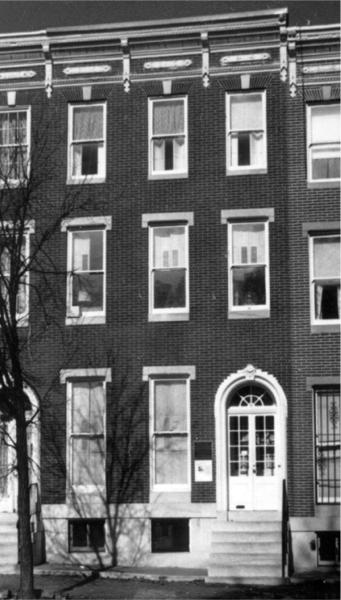 Although
Mencken conducted most of his editorial work in New York City, he kept his
home in Baltimore. The minute his work was over, he hopped on a train headed
south. “Behind lies a place fit only for the gross business of getting
money,” he wrote. “Ahead is a place made for enjoying it.” Although he
was a national celebrity, Mencken always felt that Baltimore was his home.
He took pride in the city, its people, its food and its charm. In Mencken’s
lifetime as well as today, the rowhouse on 1524
Hollins Street, overlooking Union Square, is one of the most famous
addresses in America.
Although
Mencken conducted most of his editorial work in New York City, he kept his
home in Baltimore. The minute his work was over, he hopped on a train headed
south. “Behind lies a place fit only for the gross business of getting
money,” he wrote. “Ahead is a place made for enjoying it.” Although he
was a national celebrity, Mencken always felt that Baltimore was his home.
He took pride in the city, its people, its food and its charm. In Mencken’s
lifetime as well as today, the rowhouse on 1524
Hollins Street, overlooking Union Square, is one of the most famous
addresses in America.
Back in 1880, Henry Louis Mencken was brought by his parents as an infant to 1524 Hollins Street, and lived here until his death at the age of 75. In 1930, the seemingly confirmed bachelor, Mencken, married Sara Haardt, an English teacher at Goucher College, and moved into an apartment at 704 Cathedral Street in Baltimore. When she died tragically of tuberculosis in 1935, he moved back to his old familiar home. The Mencken House is as much the home address of American letters as 221B Baker Street is to fans of Sherlock Holmes. Like Samuel Johnson’s house in London, Dante Alighieri’s in Florence and Ernest Hemingway’s home in Key West, Mencken’s house is totally identifiable with him.
Much of Mencken’s writing, reading and thinking was done in the second floor front study. In that room, surrounded by his books and typewriter, Mencken edited the books of Theodore Dreiser and suggested the works of African-American writers to his publisher, Alfred Knopf. Here is the home where councils of war were held over the suppression of books and where Mencken convinced the famous lawyer, Clarence Darrow, to defend John Scopes in the Scopes Monkey Trial. And here is where Mencken wrote the newspaper columns and books that made him, in the wards of journalist Walter Lippmann, “the most powerful personal influence” in America, celebrated for the wit and humor that many have compared to Mark Twain.
Here is also where the novelist and screenwriter James Cain remembers Mencken ready at the door to greet him with a shaker of martinis. The first floor front parlor was a typical 19th century room for entertaining, but it was the inner sitting room that was the focus of family life, where Mencken and his brother August sat before the fire; enjoying steins of beer. Perhaps more than any other area of the house, the garden provided Mencken with the most amusements. The yard was a land of enchantments that allowed him the setting for numerous escapades when he was a boy. In the back of the yard was a stable, where he and his brother kept Frank, a pet pony who once put his head through the dining room window to slurp on a bowl of home made ice cream. As Mencken grew older, he made the garden his own, building a brick wall, a pergola, and a sundial. Within the wall he inlaid various tiles, including a plaque marked for his little dog, Tessie, who is buried in the garden, as well as a death mask of one of his favorite composers, Ludwig van Beethoven. After Mencken’s stroke in 1948, the garden was a comforting refuge, a place to smoke a cigar and look at the stars.
Since September 11, the concept of home has taken on a new meaning than never before. Around the world, readers and admirers of H. L. Mencken want to see the house and city Mencken described in his books. Words are simply not enough. The home of a famous writer is not only a curiosity—it is an inspiration. During its initial years as a house museum, the site was successful. Many of the original furnishings belonging to the Mencken family were loaned or donated to the property, making it one of the best examples of how families lived during the 19th century. In comparison with many other house museums, the Mencken House has a high level of authenticity and integrity.
August Mencken once said his brother had “a special horror” of the thought that when he died the house would be “wrecked.” We at The Friends of the Mencken House are determined not to see that happen! We need your help. Won’t you join the Friends and help us preserve the house for future generations to see, enjoy, and be inspired by?